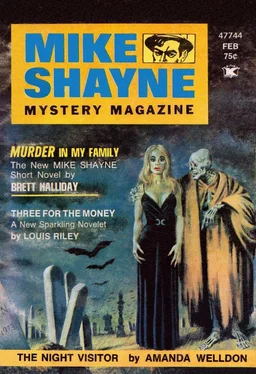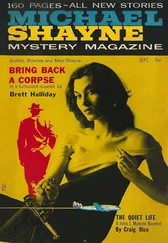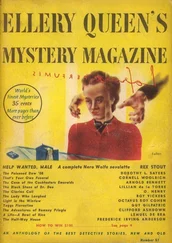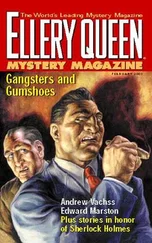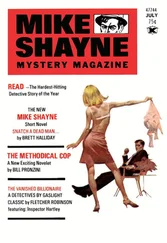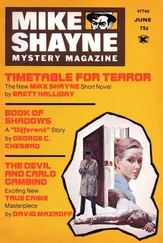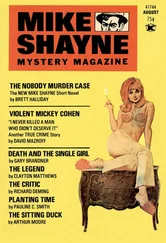Бретт Холлидей - Mike Shayne Mystery Magazine, Vol. 34, No. 3, February 1974
Здесь есть возможность читать онлайн «Бретт Холлидей - Mike Shayne Mystery Magazine, Vol. 34, No. 3, February 1974» весь текст электронной книги совершенно бесплатно (целиком полную версию без сокращений). В некоторых случаях можно слушать аудио, скачать через торрент в формате fb2 и присутствует краткое содержание. Город: Los Angeles, Год выпуска: 1974, Издательство: Renown Publications, Жанр: Детектив, на английском языке. Описание произведения, (предисловие) а так же отзывы посетителей доступны на портале библиотеки ЛибКат.
- Название:Mike Shayne Mystery Magazine, Vol. 34, No. 3, February 1974
- Автор:
- Издательство:Renown Publications
- Жанр:
- Год:1974
- Город:Los Angeles
- ISBN:нет данных
- Рейтинг книги:3 / 5. Голосов: 1
-
Избранное:Добавить в избранное
- Отзывы:
-
Ваша оценка:
- 60
- 1
- 2
- 3
- 4
- 5
Mike Shayne Mystery Magazine, Vol. 34, No. 3, February 1974: краткое содержание, описание и аннотация
Предлагаем к чтению аннотацию, описание, краткое содержание или предисловие (зависит от того, что написал сам автор книги «Mike Shayne Mystery Magazine, Vol. 34, No. 3, February 1974»). Если вы не нашли необходимую информацию о книге — напишите в комментариях, мы постараемся отыскать её.
Mike Shayne Mystery Magazine, Vol. 34, No. 3, February 1974 — читать онлайн бесплатно полную книгу (весь текст) целиком
Ниже представлен текст книги, разбитый по страницам. Система сохранения места последней прочитанной страницы, позволяет с удобством читать онлайн бесплатно книгу «Mike Shayne Mystery Magazine, Vol. 34, No. 3, February 1974», без необходимости каждый раз заново искать на чём Вы остановились. Поставьте закладку, и сможете в любой момент перейти на страницу, на которой закончили чтение.
Интервал:
Закладка:
She had not met Alan, Senior, until the day of her wedding. He had flown back from Nassau, where he was visiting, barely in time for the ceremony. Her first view of her father-in-law had been three-quarters rear one and she had thought him her fiancé. There were, to confound her, the same slim figures, the same neck and hairlines, the same typical trick of standing with one hand in a trousers pocket and the head cocked slightly the other way.
Nor, when Alan, Senior, turned to face her, had her confusion abated — for he looked far more like a twin than a father. When she remarked upon the father-son resemblance, he had smiled Alan’s dazzling smile and replied in Alan’s casual accents, “Ah, my dear, a good suntan hides a multitude of years — and sins.”
There was not, she found, a multitude of years between parent and child — a mere two decades. And when she perused the family album, she discovered that beneath bygone fashions in clothing and uniforms, behind walrus mustaches, mutton chops and dundreary whiskers, the likeness had persisted for generations in the family.
When she mentioned it to her Alan he had seemed to withdraw from her ever so slightly and had shrugged it off with, “A little likeness can be a dangerous thing, darling.”
Shortly afterward, Alan, Junior, had grown a mustache — and, returning from a trip to Philadelphia, his father had smiled at sight of it and congratulated him upon its trimness. Then Eleanor and Alan had gone to visit her family in Milton and, when they returned, Alan, Senior had been sporting a mustache that matched his son’s almost hair for hair.
This had triggered the first of the conflicts between them that had culminated in the still unexplained tragedy of Alan, Junior’s, death. But now, seated across the fine old mahogany table, Eleanor felt no wish to recall the bad times and the ultimate horror of the storm-tossed night that brought her three-year marriage to its abrupt and tragic end.
Rather, she wished to let the clock turn itself back to the only real time of happiness she had ever known, to let the past reclaim her, wrap her in the security blanket of warmer memories, to wish that events that had happened were still ahead and yet to occur.
She wished — what did she wish? Regarding the face of the man who so closely resembled the one man she had ever truly loved, she wished — for what?
And why, beneath the crust of comfort, did her diaphragm feel the unmistakeable tugging of gut terror?
II
The dinner, as always, was excellent — a tomato consommé lightly tinctured with tawny port, a rack of lamb roasted slowly in soy sauce and vin rosé with small parsley potatoes and incredibly fresh miniature green peas, a salad and a local pale cheddar cheese which Alan, Senior, claimed was unsurpassed by any of its more celebrated and more traveled cousins.
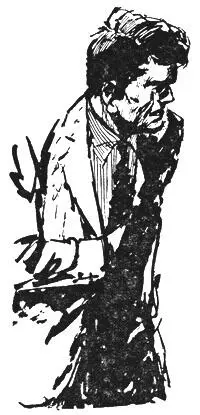
If there was one field of living in which Eleanor had benefitted from her association with the Herricks, it was in that of food. Her own family diet, like that of other old-line New England families, featured a “simplicity” that verged on total lack of flavor and imagination. The Herricks had been dining well since their New York ancestors imported their own wine in pipes from Funchal and yet remained lean and healthy as greyhounds.
Conversation was another art in which she had benefitted, though more in its enjoyment through listening than via her own voice. Throughout the meal, as during its preliminary daiquiri phase on the glassed-in porch overlooking the lake, Alan, Senior, conducted an easy monologue in which she was able to relax and enjoy without feeling forced to compete.
Although, by his own admission, he seldom strayed far from Lakeside, the incredibly young looking older man was astutely and well informed on subjects that ranged from inside Washington gossip to the condition of certain prized small vin-yards on the sun and rainsoaked hillsides of Burgundy. Furthermore, he had an instinct for the right moment to pause and let mutual enjoyment be relished in silences that were never embarrassing, merely restful.
His son, Eleanor recalled, had possessed this same gift although she, herself, had never been able to acquire either the knack or the self-confidence on which it was based.
The Patons, all three of them, served as silently and impeccably as ever.
So why, she wondered as they adjourned to the big living room where a fire crackled warmly in the great stone fireplace against the chill of the early autumn evening, did she feel uneasy, so close to the edge of fear?
Was it the turn-back-the-clock element, coupled with the still fantastic resemblance between live father and long-dead son? Was it her all too vivid remembrance of the daemonaic temper that lurked beneath the facade of easy amiability which had so enchanted her with both men? Was it the old house itself?
Early in their marriage, one wind-howling night, Alan had told her that Lakeside was haunted by the ghosts of more than one Herrick ancestor violently deceased... as it was of certain earlier colonists and Indians who had lived in the predecessors of the sandstone pseudo-Tuscan mansion — frame farmhouse, log cabin, wattle wickyup.
“I’ll take you to the family burial ground,” he had told her. “You can see for yourself.”
It lay beyond a hedge, fenced in by cutback undergrowth less than seventy yards from the woven wood fence that guarded the kitchen area. There were some two-score headstones, ranging from the relatively new white granite pillar marking the grave of the woman who would have been Eleanor’s mother-in-law had she lived, to centuries-old incised grey tablets in which early settlers had carved hideous likenesses of those who lay beneath the marks of their primitive masonry.
Like everything else in and about Lakeside, the graveyard was kept scrupulously neat, yet even at first sight Eleanor had found it depressing. The thought that she, too, might someday lie there, far from her family and friends, had given her an odd and unpleasant sense of rootlessness and inevitability.
Thereafter, when the old house creaked or sighed at night, she listened. Despite her no-nonsense heritage and upbringing, there were times when she had lain awake, trembling, fearful of the spirits of the long dead that surrounded her, whose presence she felt for all of her inability to accept their existence — while Alan, who accepted them as old friends and family, slept undisturbed by her side.
She had told no one of her fears lest she invite ridicule. At the time, she feared derision from the living far more than she feared avowal of the spectral plane.
Now, sitting by the fire with Alan, Senior, sipping fine Armagnac and growing increasingly drowsy after her one-hundred and fifty mile drive from Boston, she was no longer sure which she feared the more. Yet she was definitely afraid.
She was almost relieved when Alan, Senior, finally brought up the matter that was on both their minds — the disposal of the house and grounds when the impending resort development deal went through.
He said, rotating his full bellied brandy inhaler slowly in his hands, “I shan’t deny the selfishness of my concern, Eleanor. I had fondly hoped and believed that you would insist upon the house and its immediate surrounding acres remaining as we have known it, at least until my death.”
Despairing of her ability to explain, she laid it out for him, saying, “Of course, I have tried — in fact, I am still trying. But the engineers and designers of the project insist that...” She went on to tell him of the engineering and projected cost-accounting demands of the huge promotion, which would turn this isolated area of New Hampshire into a super-exurbia, clear of all the growing horrors of city life yet with helicopter communication that would render daily travel to and from Boston and New York entirely feasible.
Читать дальшеИнтервал:
Закладка:
Похожие книги на «Mike Shayne Mystery Magazine, Vol. 34, No. 3, February 1974»
Представляем Вашему вниманию похожие книги на «Mike Shayne Mystery Magazine, Vol. 34, No. 3, February 1974» списком для выбора. Мы отобрали схожую по названию и смыслу литературу в надежде предоставить читателям больше вариантов отыскать новые, интересные, ещё непрочитанные произведения.
Обсуждение, отзывы о книге «Mike Shayne Mystery Magazine, Vol. 34, No. 3, February 1974» и просто собственные мнения читателей. Оставьте ваши комментарии, напишите, что Вы думаете о произведении, его смысле или главных героях. Укажите что конкретно понравилось, а что нет, и почему Вы так считаете.
